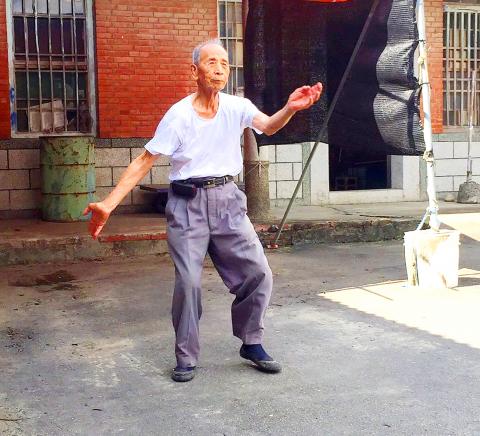The Sports Administration on Wednesday said it would start creating digital records of traditional martial arts indigenous to the nation as the pilot of a digital archive project to document the nation’s sports culture.
The pilot project would begin this year, the agency told a news conference in front the Red House Theater (紅樓劇場) in Taipei’s Ximending (西門町) area.
A martial arts group led by 91-year-old practitioner Lee Lo-tsun (李鑼村) demonstrated traditional hand-to-hand and armed combat techniques at the conference.

Photo: Huang Shu-li, Taipei Times
The agency said it plans to interview and film practitioners like Lee for the project.
A martial art known as Qikan (七崁) — the old Hakka name of Siluo Township (西螺) in Yunlin County — is an indigenous fighting style with nearly 200 years of history, Siluo Martial Arts Foundation president Lee Ming-che (李明哲) said.
However, Qikan masters are aging and local residents are concerned that the martial art will be forgotten, Lee said.
He said the concerns prompted him to ask the agency to preserve records of the martial art in a digital archive, he added.
Historically used by local residents for self-defense and warfare, Qikan includes armed and unarmed fighting styles, according to the foundation’s Web site.
Qikan practitioners use twin short swords, sword and shield, staff, spear or glaive, among other weapons, the Web site said.
Chinese Nationalist Party (KMT) Legislator Chiang Wan-an (蔣萬安) said he is happy to see children among Qikan practitioners.
“Martial arts would be useful at the Legislative Yuan. Maybe the masters can teach me a few moves,” Chiang said.
Sports Administration Director-General Lin Te-fu (林德福) said the agency would also digitize other materials related to the nation’s sports history.
Materials collected from sports academies, professional leagues, Olympic teams and the public would be digitized along with information on traditional sports, he said.
More than 100 people would be interviewed by researchers, and records and materials would be archived in a database for public and academic use, Lin said.
People who have books, memorabilia, photographs, newspaper clippings, video recordings, manuscripts or other relevant material, or know people who can be interviewed for the project, can contact National Taiwan University of Arts, he said.
Additional reporting by Huang Shu-li

Nipah virus infection is to be officially listed as a category 5 notifiable infectious disease in Taiwan in March, while clinical treatment guidelines are being formulated, the Centers for Disease Control (CDC) said yesterday. With Nipah infections being reported in other countries and considering its relatively high fatality rate, the centers on Jan. 16 announced that it would be listed as a notifiable infectious disease to bolster the nation’s systematic early warning system and increase public awareness, the CDC said. Bangladesh reported four fatal cases last year in separate districts, with three linked to raw date palm sap consumption, CDC Epidemic Intelligence

Two Taiwanese prosecutors were questioned by Chinese security personnel at their hotel during a trip to China’s Henan Province this month, the Mainland Affairs Council (MAC) said yesterday. The officers had personal information on the prosecutors, including “when they were assigned to their posts, their work locations and job titles,” MAC Deputy Minister and spokesman Liang Wen-chieh (梁文傑) said. On top of asking about their agencies and positions, the officers also questioned the prosecutors about the Cross-Strait Joint Crime-Fighting and Judicial Mutual Assistance Agreement, a pact that serves as the framework for Taiwan-China cooperation on combating crime and providing judicial assistance, Liang

Reports of Taiwanese going missing, being detained or interrogated, or having their personal liberties restricted in China increased about fourfold annually last year, the Mainland Affairs Council (MAC) said yesterday. Last year, 221 Taiwanese who traveled to China were reported missing, were detained and interrogated, or otherwise had their personal freedom restricted, up from 55 the previous year, the council said. Reopening group tours to China would be risky, as it would leave travelers with no way to seek help through official channels after Beijing shut down dialogue between the associations tasked with handling cross-strait tourism, the MAC said. Taipei’s Taiwan Strait Tourism

SHIFT: Taiwan is evolving from a transit stop into a tourist destination, with more international travelers willing to spend on tours, dining and cultural activities Taiwan rose three places in the World Tourism Barometer to 36th globally in 2024, with international tourism revenue of US$10.028 billion, the Tourism Administration said on Monday. The UN Tourism Organization publication said that its focus has switched from whether a country has returned to pre-COVID-19 levels of tourism to the amount spent by a tourist during an overseas trip. The nation last year welcomed 8.57 million international tourists, about 9 percent more than in 2024, with most tourists coming from Japan, South Korea, and Hong Kong and Macau, all of which accounted for at least 1 million tourists each. During the first